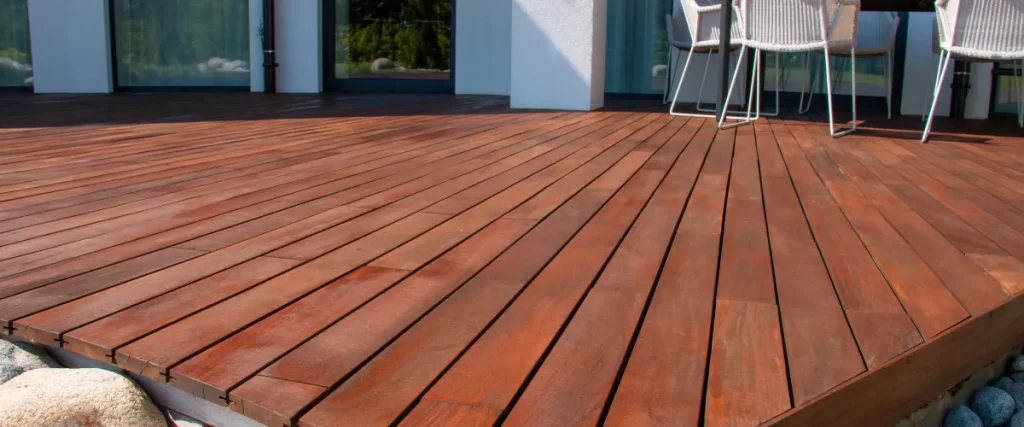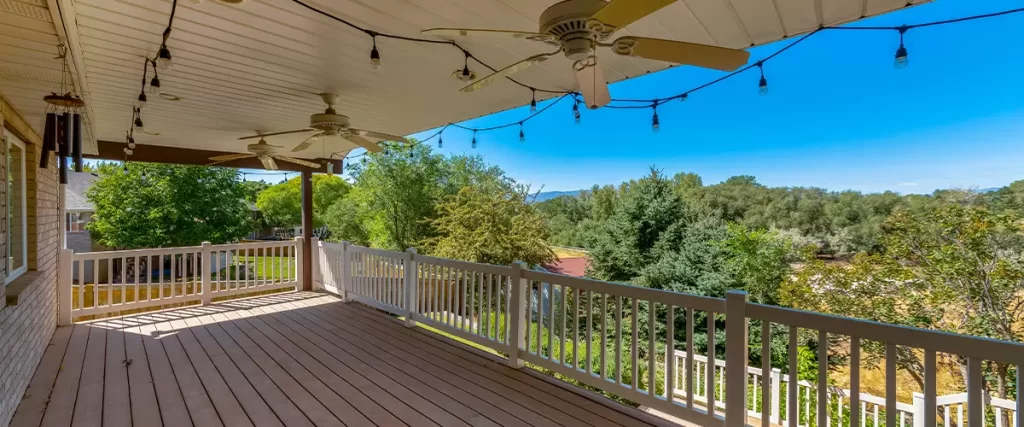If you’ve ever looked at your sloped backyard and thought, “What can I even do with this?” you’re not alone. A sloped yard can feel like a design roadblock, especially when all you want is a comfortable, flat space to entertain, relax, or let the kids run around safely.
But here’s the truth: a sloped yard isn’t a problem, it’s an opportunity. With the right deck design, your tricky terrain can be transformed into one of the most beautiful and functional parts of your property.
In this guide, we’re going to walk through everything you need to know about designing a deck for a sloped yard, from smart structural solutions to creative styling and what to keep in mind as you plan. So, if you’re working with hills, dips, or uneven grades, you’re in the right place.

Why Sloped Yards Deserve Special Deck Designs
Let’s start with the obvious: building on a slope isn’t the same as building on a flat surface. You have to consider elevation changes, water runoff, soil stability, and how to anchor everything securely. It’s not just about aesthetics, it’s about safety, durability, and smart use of space.
That’s why choosing the right deck design for a sloped yard is so important. The right layout doesn’t just give you a flat place to hang out; it works with the slope, rather than fighting against it.
Popular Deck Designs That Work Great on Sloped Yards
Whether your yard has a slight incline or a dramatic hill, there’s a deck design that can make it work beautifully.
Multi-Level Decks
Think of this like a tiered cake. Each level gives you a flat, usable space that steps down (or up) with the slope. This is a great option if your yard has a steep grade.
Benefits:
- Breaks up the space into functional zones
- Adds visual interest
- Great for entertaining, dining, and relaxing all in one
Floating Decks
A floating deck, sometimes called a platform deck, sits slightly above ground and doesn’t attach to the house. These work really well on mild slopes and can be easier to install in certain conditions.
Benefits:
- Simple, low-cost option for smaller slopes
- Can be repositioned or expanded
- Doesn’t require as much excavation
Elevated Decks
Perfect for homes that are already elevated or yards with a steep decline. These decks are built on sturdy posts and often include stairs down to the yard.
Benefits:
- Offers great views from up top
- Can create a shaded space below
- Ideal for walk-out basements or raised homes
Wraparound or Curved Decks
For properties with odd angles or winding slopes, curved or wraparound decks can feel more natural and organic. These work well when you want to blend the deck into the landscape.
Benefits:
- Follows the shape of your land
- Looks custom and high-end
- Helps you use irregular space wisely

What to Consider When Building a Deck on a Slope
Before you grab a shovel (or even a sketchpad), there are a few key things you need to think about when planning a deck for sloped terrain.
Drainage and Erosion Control
Slopes naturally direct water downward, right toward your deck foundation. Proper grading, drainage channels, and erosion control methods are essential.
Foundation Options
On uneven ground, you’ll likely need deep footings, piers, or even helical piles to make sure your deck doesn’t shift over time. This isn’t something to skimp on.
Access and Safety
Stairs, handrails, and landings are all critical components of decks on hills. Make sure you plan your entry points carefully and keep things safe and to code.
Building Codes and Permits
Decks, especially on slopes, often require permitting due to their height and structural needs. Always check with your local building authority (example link to local permitting site). This step helps ensure long-term safety and can save you headaches down the line.
Materials That Work Best for Sloped Yard Decks
You want materials that are strong, weather-resistant, and low maintenance especially if your deck is elevated or exposed.
- Pressure-treated lumber: Affordable and durable, great for structural support.
- Composite decking: Low-maintenance and long-lasting, ideal for walking surfaces.
- PVC decking: High resistance to moisture and temperature fluctuations.
- Steel or aluminum framing: A great choice for stability on steep slopes.
Design Ideas to Make Your Sloped Deck a Showpiece
Want to go beyond just “functional”? These ideas can help your deck become the star of your yard:
- Add built-in planters that blend with the slope
- Use glass railings for an unobstructed view
- Incorporate landscape lighting on stairs and under each level
- Create a lower fire pit area with a stone patio
- Build under-deck storage or a shaded lounge below an elevated design
Top Decking Material Manufacturers for Sloped Terrain Projects
Quality materials matter when you’re building on a slope. These top decking brands are known for their durability and versatility in challenging builds.
Trusted Brands for Decking Materials
- Trex: Industry leader in composite decking, known for strength and low maintenance.
- Fiberon: Eco-friendly, attractive options with solid slip resistance.
- TimberTech: Offers premium performance and realistic wood aesthetics.
- Deckorators: Innovative styles and solid build quality.
- AZEK: High-end PVC decking with superior moisture resistance, great for high-humidity areas.
Why Homeowners Trust Our Team for Sloped Deck Designs
We’ve been designing and building decks on all kinds of terrain for years, flat, hilly, and everything in between. We understand the nuances of working with sloped yards, from the ground up. Our team has the experience, craftsmanship, and know-how to deliver a deck that’s safe, stunning, and built to last.
As with most things, experience makes a difference. The right design, the right materials, and the right execution can save you time, money, and frustration later on.
If you’re ready to get your sloped yard project rolling, contact us at (865) 801-4545 today. Let’s turn that hillside into something amazing.

Frequently Asked Questions
Can I build a deck on a steep slope?
Yes, but it requires proper planning, strong support systems, and often deeper footings to keep it secure.
Do I need a permit for a deck on a sloped yard?
Most likely, yes. Elevated decks often require permits. Check your local building department’s guidelines.
What kind of foundation is best for a sloped yard?
Concrete piers or helical piles are commonly used. The type depends on your soil and slope severity.
How high off the ground can my deck be?
This varies by local code. Generally, anything over 30 inches off the ground needs railings and proper support.
Is it more expensive to build a deck on a slope?
Usually, yes. There’s more labor, materials, and engineering involved. But it adds great value to your property.
Can I use composite decking on a sloped yard?
Absolutely. Composite is ideal for challenging terrain; it’s durable, weather-resistant, and low-maintenance.
How long does it take to build a deck on a hill?
It depends on size and complexity, but most take between 2 to 4 weeks once construction begins.
Can I add multiple levels to my sloped deck?
Yes, and it’s a great way to make the most of your terrain. Each level can serve a different purpose.
Final Thoughts: Make Your Sloped Yard Work For You
Building a deck on a slope might seem like a challenge, but it’s one of the best ways to turn tricky land into something usable and stunning. With the right design and materials, your hillside can become your favorite hangout spot.
So, whether you’re dreaming of a two-tiered party zone or a peaceful platform tucked into the trees, just know: you don’t have to fight your slope, you can build with it.
Ready to make it happen? Contact us at (865) 801-4545 and let’s start planning your deck-building project unique backyard.

